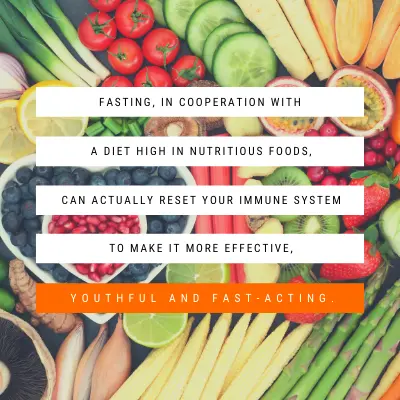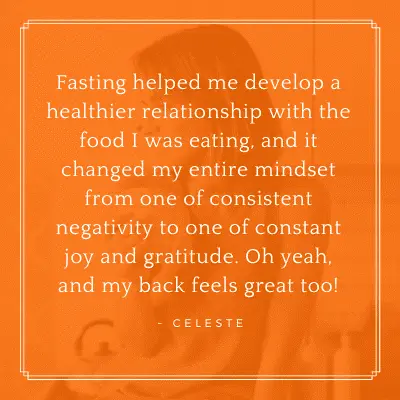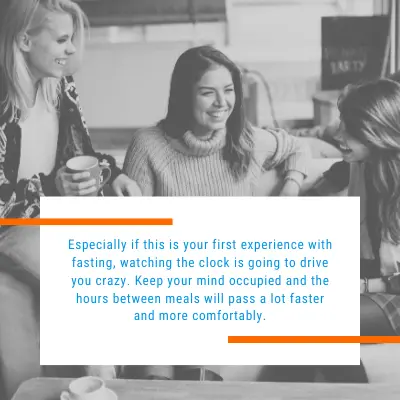The world has been buzzing about the health benefits of fasting for years now, long enough for people to really start believing that it is healthy. It seems to be a trend that’s here to stay, rather than simply being a fad. There have been claims that it can help you lose weight, stay youthful and even cure cancer.
I have to admit, when I first came across the idea of fasting many years ago, I not only thought it was too good too possibly be true, but I also knew that it was contrary to everything I had been taught about healthy eating growing up. Considering you’re here on my website today, I’m sure you can tell that my opinion has been swayed more than a little.
I now believe that fasting is too good to ignore, and this article is going to answer the question “is fasting healthy” in as much detail as possible.
Disclaimer: This article is not written by a doctor and nothing you read here or anywhere on this website should ever be construed as medical advice. If you have any medical conditions you should always discuss treatment options with your own doctor.
Fasting Health Benefits
I personally began fasting because of chronic pain in my lower back. For many years I assumed it was caused by my job, but the more I learned about my own body and how it works, the more I realized that there was a lot more going wrong with my body than just carrying heavy bags for my sales rep work.
Fasting helped me develop a healthier relationship with the food I was eating, and it changed my entire mindset from one of consistent negativity to one of constant joy and gratitude. Oh yeah, and my back feels great too!
My personal experience with fasting seems minor compared to some of the real-life stories I’ve heard, and case studies that I’ve researched. Whether you’re struggling with weight, pain, disease or you simply want to improve your overall quality of life, fasting can be your solution.
Fasting for Longevity
There is a difference between living to be 90+ years old in a home with a full-time caretaker and living to be 90+ years old in your own home, spending time with friends and family, enjoying good food and learning about things that still capture your attention.
Your lifespan is how many years you live, regardless of the quality of your life. Healthspan is how many of those years are spent in good health, rather than in a state of disease. In my opinion, healthspan is obviously the one to focus our attention on.
Fasting has long been seen as a way to help our bodies naturally regulate hormones and digestion, reduce inflammation and keep ourselves as disease-free as possible. If we can achieve this, we will stay healthy for a dramatically larger portion of our lives.
Disease doesn’t just arrive one day, out of the blue. Even in the case of being infected with a virus or a malicious bacterium, if your immune system is strong and healthy, you’re less likely to be severely affected by the infection. Your immune system is even responsible for how quickly or slowly you recover from an injury. How effective your immune system functions fluctuates through your life, often due to choices we make in regard to our diet and lifestyle, but also to factors such as our environment and mental or emotional state.
Fasting, in cooperation with a diet high in nutritious foods, can actually reset your immune system to make it more effective, youthful and fast-acting. This will not only keep you healthy day to day, but it also protects you from future disease that results from a slow and steady breakdown of your essential biological functions.

Fasting for Weight Loss
Fasting is not necessarily a diet, but it’s a way of eating, and that often triggers questions around the idea of weight loss. Simply put, if you don’t eat, you’re going to lose weight. But fasting, although very simple, is also more complicated than that.
Fasting can be incredibly effective in helping you manage your weight naturally, finding the balance that is right for you and your health. By stopping the regular access to easy fuel, fasting encourages your body to access stored energy instead, which comes from our fat.
We all know that the more we eat, the more weight we’re likely to gain. This is because our bodies are designed to welcome extra energy in order to store it for the future potential of not having access to food. And yet we consistently look for other reasons. It’s the carbs. Or the fats. Or the animal products. Or the toxins in our food.
There is much more to weight management than calories in versus calories out.
The simple truth is if we stop eating, we will stop gaining weight, regardless of what it is that we’re eating. If we stop eating regularly enough, our bodies will be forced to dip into the emergency supply of energy that it has been stockpiling for years: our fat. We will start to lose weight.
Fasting is not the same thing as starving yourself. Fasting is a planned, strategic elimination of calories, with the knowledge of exactly when you will again introduce food to your body. This is a very healthy, 21st century version of the periodic feast and famine circumstances humans were biologically designed to encounter.
In addition to simply helping us burn through stored fat, fasting trains our metabolic and endocrine systems to work efficiently. Convenience often leads to laziness, and a lazy digestive or hormonal system leads to severe dysfunction. This dysfunction leads to many of the diseases we so desperately want to avoid.
Fasting for Disease Management
Heart disease is the leading cause of death worldwide, with dementia, diabetes and various cancers catching up quickly. They are all terrifying and terrible diseases to fight against, and periodic fasting throughout your life is one simple and straightforward way you can reduce your risk for all of them, even cancer.
More and more studies are showing that heart disease is linked to how your body metabolizes sugar and, as you might suspect, cholesterol. Diabetes is, of course, also a metabolic disorder in which your body can’t properly contend with sugar. There’s a lot of evidence suggesting that metabolic disease is a risk factor contributing to both cancer and Alzheimer’s and dementia.
Simply by helping your body repair it’s natural metabolic health and hormone balance, you will reduce your risk for all of the major so-called chronic diseases. Fasting is the most efficient way to do this.
Beyond our metabolism and our hormones, fasting also triggers an incredible biological process called autophagy. Autophagy is your body’s natural recycling process that is only put to work when extra energy is required. Through this process, old, worn-out and damaged cells are broken down and recycled. This not only provides a source of energy in a fasted state, but it also removes the potential for those damaged or dead cells to turn into something dangerous, like cancer.
Fasting truly is a remarkably simple way to put our biological systems to work in order to naturally prevent and manage disease.
Is Fasting Safe
For most people, fasting is not only safe, but it can be potentially life-saving.
There are some people who shouldn’t fast, at least not without a very good reason and very specialized supervision.
Children generally shouldn’t fast. Growing bodies will thrive on a more consistent source of nutrition. There may be situations where someone under 18 can benefit from a fasting protocol, but it should always be with the guidance of a specifically trained professional.
Similarly, pregnant women and breastfeeding mothers should avoid depriving their bodies and their babies of nutrition for prolonged periods of time.
People who are underweight or who have eating disorders are likely to find that fasting can create further problems with their health and it’s not an advisable course of action for them.

Fasting With and For Medical Conditions
We’ve already discussed the benefits of fasting on many diseases, but if you have a diagnosed medical condition, fasting may have certain risks or advised protocols for your unique situation. I know I’ve said this before, but it’s worth stressing again, you should always work with your doctor before making any significant changes to your lifestyle.
Fasting can change the way certain medications act, so this is one question you want to ask your doctor specifically. In most cases, there is a safe way to adjust fasting or medication to best benefit your health and circumstances, but it will vary for each individual.
Certain conditions, such as type 1 diabetes, liver, kidney or heart disease or if you have conditions related to uric acid, such as gout, will require you to have complete and careful medical supervision if and when you decide to fast.
The potential for health benefits in almost every situation highly outweighs the risks, but only if the proper precautions are taken.
Short Term vs Long Term Fasting
Fasting comes in many different forms and has been popularized under many different terms. Our ancestors fasted out of necessity and major religions across the world have been encouraging it for centuries. Some people love the challenge of a lengthy, 7+ day water fast while others prefer to work it into their regular routines through intermittent fasting or time-restricted feeding. There are benefits to all of the above, but it really comes down to what works best for you, as an individual.
Individuality – Is Fasting Healthy for You
The Ketogenic Diet is one of the most popular dietary trends of our decade, and because of this, you’ve probably heard the term “fat adapted.” If you haven’t, the simplest definition is a metabolic state in which your body is used to burning through stored fat as an energy source rather than relying on the easier supply of glucose. You do not have to follow a Keto diet in order to get the benefits of fasting, but the truth is that, if you’re used to feeding every few hours that you’re awake, your metabolism is not going to immediately be prepared to start burning fat. It has to be conditioned.
Every body is unique, beyond our DNA. Everything that you have done in life up until this very moment has taught your body to react in a certain way. You have been conditioning your body all your life, whether you meant to or not. If you’d like to change the way your metabolism works, you need to re-condition it.
Fasting can, undoubtedly, be healthy for you. But how you fast and how long it takes your one-of-a-kind body to adapt and change will be unique to you. The key is to have patience and forgiveness for yourself and do your best to never compare your results to anyone else’s.
And, of course, if I can say it one more time, having supervision and a doctor’s input is also important, especially if you’re already coping with any health conditions.
Fasting as a Lifestyle
The benefits of fasting even once are astounding, but health is a lifelong adventure, and fasting should be on that journey with you the entire way. You don’t have to fast every day, but it should be a part of your life, at least every year. Aside from having huge benefits to your health, fasting is simple and free – you simply stop eating. There are no rules to follow or fancy pieces of equipment to buy.
Top 10 Tips for Transitioning to a Fasting Lifestyle
- Get approval from your doctor. If you have any health concerns at all, you should always consult your doctor before changing anything about your eating or exercise routines.
- Transition with a plan. If you’ve been following a standard American diet (SAD) or even if you have been eating high-quality food, but eating it throughout the entire 16 hours you’re awake each day, your body is going to need some time to adjust to fasting. Don’t launch into a 7-day water fast. Start by restricting the amount of time you eat per day to 12 hours and work your way up from there. If you have a disease or specific reason for needing to take immediate and more drastic action, find a fasting specialist within the medical community near you and make sure you’re well supervised.
- Support your fast with nutrition. Before you fast, make sure you provide your body with a healthy dose of nutrition to help it through the period of fasting. Follow your fast with a slow introduction of nutrient-rich food to help your body adjust to metabolizing energy again, and give your cells all the proper vitamins and minerals they need to thrive.
- Drink plenty of water. Unless you’re specifically doing a dry fast, one of the best ways to stave off the worst of the hunger pains and keep you alert and high functioning is to drink plenty of water throughout your fast. You can drink black coffee or tea without technically breaking your fast, but you don’t want to only drink coffee or tea. Focus on hydration, but don’t force yourself to deal with caffeine withdrawal if that’s a concern for you.
5. Keep Yourself Occupied

- Plan your fast. Even if you’re starting with time-restricted feeding of only 12 hours a day, you need to take into consideration your social life, your work life, and your sleep schedule. If you’re going to be starting a more prolonged fast, you really have to plan your life accordingly so that you know how you’re going to prepare for your fast, what activities you’re going to do while you’re fasting, and how and when you’ll break your fast. This is not something that you can or should decide to do on a whim.
- Maintain common nutritional sense. Fasting should not be used as an easy button to lose a few pounds for a special event and then return to poor eating habits. You certainly shouldn’t reward a great fast with a binge eating session. Fasting should be a supplement to an otherwise healthy lifestyle, to the best of your ability.
- Listen to your body. If you’re new to fasting, you will get hungry. Even if you fast regularly, you’ll probably experience hunger. This is normal and completely safe. However, if you experience light-headedness, diarrhea, muscle cramps or other significant discomforts, consider breaking your fast. This might mean introducing a small number of calories to rebalance your electrolytes and then continuing to fast, or it might be stopping for the time being. If you’re concerned, talk to your doctor or certified fasting professional.
Exercise is a good option.
- Exercise and fasting can work really well together, but one does not require the other. If you don’t currently follow a regimented exercise routine, get used to fasting alone and avoid stressing your body any more than normal. Of course, some movement during your day is important for health, but there’s no need to force yourself to the gym or train for a marathon while you’re training your body to adapt to fasting. On the other hand, if you’re worried that you won’t be able to exercise, you can release that stress from your mind. You may need to adjust your routine or timing, but many people workout during their fast. You simply have to find what works for you, safely.
- Have health as your goal. Losing weight is a very common goal but shouldn’t be your priority. Instead, have a goal of optimizing your health, and know that your weight will take care of itself in time. Unless there’s a pressing need to reduce your weight quickly, it’s really important to remember that you didn’t put on all the weight in 5 days, and you shouldn’t expect it to disappear in 5 days either. Even if it does, your goal should be to maintain a healthy body for the rest of your life, not reach a number and then return to poor habits.
Healthy Fasting for a Long, Healthy Life
I have never met a single person who enjoyed dieting. It’s not fun. Counting calories, eliminating your favorite foods, and turning a highly pleasurable activity – eating – into a miserable exercise in deprivation is not good for your body or your mental health. It just isn’t.
Fasting is an alternative to the yo-yo dieting rollercoaster.
It should never be treated as an excuse to binge eat after a fast or otherwise eat unhealthfully, but it can be a really effective and simple way to organize your eating habits into a routine that is going to best benefit your health for the long term.
There are many different ways to fast, but one of the most popular and easiest to adapt to is commonly referred to as Intermittent Fasting (IF), and it’s how I personally choose to incorporate the practice of fasting into my life.
The term time-restricted feeding (TRF) is more accurate, but IF refers to the regular practice of confining the window for eating to no more than 12 hours a day, and no less than once every 24 hours.
For example, a 16:8 schedule means that you fast for 16 hours a day and feed for 8 hours a day. Of course, you don’t eat for 8 straight hours, but you restrict all your calorie intake to within an 8-hour window. This can coincide with calorie restriction, a specific diet or even exercise regimen, but it doesn’t have to.
You Don’t Have To Go It Alone
If you’d like help transitioning to a fasting lifestyle in your own personal, unique life, I’d love to have a one-on-one conversation with you. I want to hear about your struggles and learn what your goals are. As a fasting coach, my job is to help you overcome the first in order to reach the second in a more joyful and sustainable manner than you ever dreamed possible.
Schedule our first conversation now. We’ll talk for 20 minutes at no cost to you to make sure that we’re a great fit and work out the details after we’ve met.




